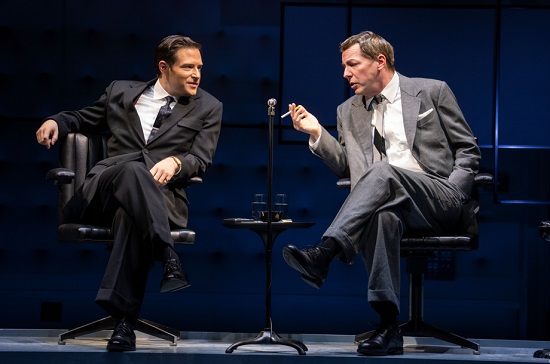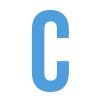Good Night, Oscar

Tickets from $79 Buy Tickets

Cititour.com Review
If the entrance applause for Sean Hayes is a little quieter than one might expect when he finally appears onstage at the Belasco Theater about 15 minutes into Doug Wright’s entertaining bioplay “Good Night, Oscar,” it’s because much of the audience may not immediately recognize him, even after two decades of TV and theatre stardom. By the end, though, audiences can’t jump to their feet fast enough! To call Hayes’ work here “a tour-de-force” performance is accurate, while not really doing it justice.
One of the many surprises of this crowd-pleasing production, directed with panache by Lisa Peterson, is how thoroughly Hayes has transformed himself -- primarily through body language and posture (and with a little help from Emilio Sosa’s drab costumes) -- into Oscar Levant, the famed musician and raconteur who thrilled and shocked television audiences with his candid, self-deprecating and frequently off-color humor. The second big surprise (for some) is that Hayes – as he brilliantly demonstrates in the show’s final section – is possibly just as great a pianist as Levant ever was.
Like most “bio-plays,” this one needs a set-up that allows us to learn about Levant, past and present -- as well as demonstrate his cutting-edge wit, showcase the effects of his painful mental illness, and, yeah, tickle the ivories. And Wright, playing just a little fast and loose with actual history, finds a clever one that does the trick more organically than most.
Here, Levant is set to appear on the first live West Coast airing of “Tonight with Jack Paar,” although neither the smooth-talking, egotistical Paar (a fine Ben Rappaport) nor his less-than-charming boss, NBC President Bob Sarnoff (an effective Peter Grosz) are aware that Levant is coming directly from a nearby sanitarium -- until Levant’s long-suffering wife June (a first-rate, beautifully dressed Emily Bergl) arrives to confess the truth.
Sarnoff has already objected to Levant’s appearance – worried he will offend the show’s Midwestern viewers -- but June makes her case that being on Paar’s show might literally save her husband’s life, and the host is adamant about having Levant on as his guest. (I do think Wright might have expanded upon the fact that in 1958, the show’s setting, Paar’s show had been on the air for no more than a year and could have easily been cancelled, making Sarnoff seem a little less villainous than he comes off.)
Soon, we’re in Levant’s dressing room (the simple but spot-on set is by Rachel Hauck) and within seconds, Hayes proves masterful in showing both Levant’s physical decline – all slumped slouching and shaking hands – and mental deterioration. Using a bit of his now-patented comic timing, Hayes also tosses off one-liners with the speed of light, but the jokes are mostly aimed towards Levant.
Hayes is also incredibly moving as he recalls some key moments of Levant’s life and career -- most notably his less-than-successful struggle to escape the shadow of his “friend” George Gershwin (who appears in flashbacks in the matinee idol form of John Zzdorjeski) – taking joy in none of his past.
Levant also constantly begs his accompanying orderly, the super-dedicated Alvin (a superb Marchant Davis) for more drugs; but he won’t give into his patient’s demands. Denied and desperate, Levant convinces Paar’s celebrity-worshipping assistant (and Sarnoff’s nephew) Max (an adorable Alex Wyse) – who literally lives up to both parts of “idiot savant” – to do the dirty deed.
The pills almost kill Levant, but also leave him in such a state that Paar – eager to make his own points about how live television (especially comedy) should be free from network interference – easily gets his guest to say some of the most shocking and occasionally tasteless jokes ever to get airtime. (In reality, Levant made most of the statements heard in the play – including a gasp-inducing one about Arthur Miller and Marilyn Monroe – but not in this context.)
The drugs also play their part in convincing the initially reluctant Levant to play the piano on the show, although an internal battle arises about what selection he will choose. Eventually, Hayes stuns with his rendition of Gershwin’s landmark composition, “Rhapsody in Blue” (which was Levant’s signature piece), leading to copious, well-deserved applause!
Indeed, I understand why dramatically Wright felt he needed a couple of more scenes after this virtuosic display to wrap up this story. But it might have been wiser to finish “Good Night, Oscar” on such a high note.
By Brian Scott Lipton
Visit the Site
https://goodnightoscar.com/
Open/Close Dates
Opening 4/24/2023
Closing 8/27/2023
Theatre Info
Belasco Theatre
111 West 44th Street
New York, NY 10036
Map
Comments


 Sign up for our newsletter !
Sign up for our newsletter !